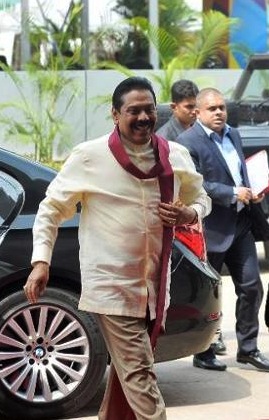By Michael Roberts –

Dr. Michael Roberts
I. Michael Roberts: “Setting the Context — Fragments of Data”
The recent ‘recovery’ of Fr. Gaspar Raj’s information on the various ideas and lines of endeavour directed towards saving the LTTE leadership in the dire circumstances confronting them in 2009, together with the interjections of PK Balakrishnan and Muralidhar Reddy that convey indirect information from other sources, provide one with significant wisps of data on the strategic “pursuits” favoured by USA in relation to Sri Lanka in 2008/09. I use the term “pursuits” advisedly here as an omnibus term for the USA’s mixture of goals, a ‘product’ that I hope to clarify, via conjecture and by analytical deduction, in essays to be written after the Wikileaks disclosures of US embassy despatches[1] have been digested.
The information in this respect within the Gaspar Raj item has particular value because this Tamil Jesuit from southern India is a rabid nationalist who has been an ardent supporter of the LTTE and continues to voice extremist claims, including charges of “genocide” levelled at the government of Sri Lanka.[2]
Daya Gamage has recently revealed that the Political Attache at the US embassy in Colombo, one Mike Owens, had this to say on the 6th May 2009 (without, apparently, being fully alive to the fact that the LTTE military capacity was at its last gasp).

KP
“Why did [the LTTE] have a following in the beginning? And I think it’s because some in the Tamil community do have legitimate grievances, and we need to find — I think its imperative for Sri Lankans to find a way to give everyone in the community, all Sri Lankans a legitimate voice in their government….. We are trying quietly …… to find a way for the LTTE to surrender arms possibly to a third party in the context of a pause in the fighting, to surrender their arms in exchange for some sort of limited amnesty to at least some members of the LTTE and the beginning of a political process.”[3]
Gamage came into my orbit only in June-July 2014. However, previously in April 2014, without access to the type of material that he has divulged, in a broad-ranging article in Groundviews entitled “Generating Calamity…” I referred to “an unverified thread of rumour suggesting that a couple of US military officers had been introduced to the SL Army HQ in May 2009 to work out the modalities of a possible intervention from the US Pacific Command designed to contain the remaining LTTE forces and rescue the civilians” (Roberts 2014a).
This essay immediately drew a salvo of scornful comments from the assassins who patrol this web site, among them one “Fitzpatrick” or “Fitzpatrick Alex f.” Fitzpatrick once again entered the fray in typical disparaging style early this month of October 2014 when he commented on my article, “AL-Jazeera Video Footage and Reports from the War Front, 7th October 2008,” in the Colombo Telegraph web site.
That essay ended thus:
“Birtley’s evaluation was on the mark, though the LTTE’s last stand was not around Mullativu,[7] but centred upon the coastal strip on the eastern side of Nandikadal Lagoon and betwixt lagoon and sea because their high command was anticipating an international rescue operation to avert a “humanitarian disaster.” The pressure and persuasion exerted upon the Tamil civilians of Thamilīlam to move enmasse towards the east as they retreated was designed to seduce such an operation from nations, led by the USA, partial to the survival of the LTTE as a political force. Birtley’s comments thus far in this specific documentary do not reveal any sign that he discerned this aspect of the military-political scenario.
Ignoring the hyperlinks (a manifest act of dishonesty), Fitzpatrick proceeds with majestic sarcasm and a spray of mud: “… ‘designed to seduce such an operation from nations, led by the USA, partial to the survival of the LTTE as a political force.’ Any proof the US wanted this? Not that Roberts will bother with providing evidence. Last time he reported on the war on Groundviews, “Sri Lanka campaign” asked him a series of very relevant question. Which were then transmitted personally by the Groundviews editor (in case he did not read the comment on the site), He went SILENT. So much for journalistic ethics. Maybe this time I will get a reply but I very much doubt it. Are these articles supposed to remind people he has a book out? Are the sales poor? Maybe like the regime found out in Uva, the war is not selling anymore?”
Need it be said here: there is no point in battling such obtuseness and deceit within circumstances and/or ‘battle-sites’ that are weighted in favour of the Fitzpatricks and Native Denizens of this world. In debate as in war one has to choose one’s sites of tussle whenever feasible. However, those in the public realm who are more honest and less one-eyed have every claim to receive pertinent data and contentions.
Among the material leading me to that conclusion in the article on Al-Jazeera as well as some arguments presented in such essays as “BBC Blind” and “Generating Calamity” was the evidence arising from David Jeyaraj’s enterprise in extracting a detailed Q and A session from Selvarāsa Pathmanāthan, or “KP” as he is known, on 10 August 2010 (Jeyaraj 2011 initially presented within his web site in 2010). A man from Velvittathurai like Pirapāharan, KP had been Velupillai Pirapāharan’s best man at his wedding in Tamilnadu and rendered yeoman service to the LTTE as its international organiser and chief arms procurer[4] from the 1980s till December 2002.[5] In parenthesis let me note that this change of personnel was probably a factor, albeit a secondary one, in the decline of the LTTE.
Then, on 31st December 2008, Pirapāharan telephoned KP and in the course of a long conversation requested KP to resume his purchasing and transport services again, a request KP could not refuse (Jeyaraj 2011: 23-24).[6] As the situation in the Vanni Pocket (see map) worsened, one of KP’s goals, from his location in Thailand and Malaysia, became the rescue of the LTTE leadership. That is why the exchange with Jeyaraj is invaluable. It has been in the internet realm since August 2010, but the character assassination merchants of the cyber-world seem unaware of the treasures it holds. That is why I reproduce a segment that is pertinent to the debate activated by Gamage, Gaspar Raj et al in a domain that I control (while inviting the assassin-merchants to enter the domain if they so wish[7]).
The whole of the Q and A session between Jeyaraj and KP is available as a booklet (2012); but an internet version is now accessible in Three Parts here and here. Readers are encouraged to study the whole.
Let me conclude by noting that this item of evidence and the data in Gamage, Gaspar Raj and my single Wikileaks item to date must be carefully deciphered in order to piece together the programs and measures taken by that self-appointed Police Commissar for the World, namely, USA, to sort out the situation in Sri Lanka — measures that they apparently wished to work out
(A) a ceasefire involving;
(B) a surrender or “lock-out”[8] of LTTE arms;
(C) the promise of a partial amnesty for Tiger leaders and
(D) an US naval and marine operation that would whisk the Tiger leaders to safety.
These, I stress, seem to have been IDEAS that were toyed with. Careful detective work is required to work out HOW FIRMLY each facet was pursued and WHEN PRECISELY and HOW each came to the forefront as actual aim or measure.
To this set of issues we must add ‘subsidiary issues’:
(E) To what extent were leading UN officials and/or the Norwegians incorporated within these programmatic ideas/endeavours; and
(F) where were the Tiger leaders going to be deposited — Trincomalee (KP in Jeyaraj 2011: 30) or one of the three countries (one in Asia and two in Africa) which KP had in view when he frantically thought of using LTTE pilots, a helicopter[9] and LTTE ship to extract some Tiger leaders and/or the Pirapāharan family from their entrapped situation.[10]
II. Jeyaraj and KP in Question and Answer, 2010
Q: I want to clarify something. I hope you will give me a candid answer.Was this peace initiative to bring about a ceasefire a time–buying exercise? Were you striving for a ceasefire on the one hand and trying to buy arms and ship them on the other?
A: My answer is NO.
I do not know about others in the LTTE leadership. Some may have thought of using it as a ploy but I was sincere and serious about a ceasefire. I was genuinely trying for one because I knew the LTTE was doomed if the war continued and I wanted to save the life of the people, Prabhakaran, my other comrades and the young fighters of the movement.
I did not play a double game of trying to negotiate peace and acquire arms at the same time. I believe in doing whatever task at hand with sincerity and without deception. If I were to try hard for a ceasefire openly and at the same time try to transport arms clandestinely it would be dishonest. I have to give my 100% to peacemaking and nothing else.
Also look at it this way. If I were found out or if international players helping me for a ceasefire got information that I was shipping arms then my credibility would have been lost. Trust in me and the intentions of the LTTE would have been destroyed. Just imagine the Sri Lankan government’s position if it was discovered that I was playing a double game?. All chances of a ceasefire would have been lost forever.
Q: Did this mean that the LTTE was not trying to ferry arms while you were working towards a ceasefire?
A: What I can say is that I was not doing or trying to do anything of the sort. But others may have been trying. You see with arms procurement and transport becoming difficult Prabhakaran had delegated such duties to some other divisions also. While Aiya was in charge of arms procurement the intelligence division under Pottu Amman, the international affairs division under Castro and sea tigers under Soosai were also delegated arms procurement duties. The situation was so desperate that Prabhakaran had put all these actors on to this stage. But still no progress was made.
Q: It looks like a case of too many cooks spoiling the soup. Do you think that you may have never let this situation develop had you been in charge all along?
A: Well I must say that arms procurement is not a simple thing like buying things over a counter. It is because of inexperienced eager people being entrusted with this task that some arrests were made like in Canada and the USA
When Soosai, Sornam and later Prabhakaran spoke to me they did say that it was a mistake to have removed me from arms procurement and that these problems would not have occurred if I was in charge
Though I was happy to hear that I doubt whether I could have managed to succeed under changed circumstances. With powerful countries monitoring movements like us in the global war against terrorism and the performance of a highly improved navy, I too may have found it difficult to procure and transport arms as required.
Q: Again let me ask you – were you trying for a ceasefire only to save the LTTE or was your commitment to peace deeper and really genuine?
A: I am glad you asked me this because I can speak openly about my change of heart. It was a slow process.
The time that I was out of the LTTE and leading a quiet life gave me time to give deep thought and reflect on things. I was also able to observe the world being transformed in the aftermath of September 11th 2001. Earlier they used to say one man’s terrorist is another’s freedom fighter. Now they were saying there is no good or bad terrorist. All are terrorists
I realised that a movement like the LTTE could not continue to fight and survive in a changing environment. The whole world will gang up against us. Also after decades of conflict the Tamil people were suffering. They needed peace.
So I really thought we must negotiate and reach a political settlement. Bala annai and I were of the same mind in this. I tried to convince Prabhakaran also of this. He then said to negotiate we must have a ceasefire first. So I began working earnestly for a ceasefire as a first step for a negotiated peace
Q: But were you really hopeful of a ceasefire? were you not fighting a lost battle? Looking back with the wisdom of hindsight what do you think?
A: At that time I was really hopeful about a ceasefire. I knew that somehow a ceasefire had to be brought about to save the lives of the LTTE leaders, cadres and innocent civilians caught in the middle.
Q: Did you not try to save the civilians by getting the LTTE to release them?
A: I did try at the start.
There was even an offer by the Americans to transport them by sea to Trincomalee. But the LTTE hierarchy was not agreeable. This attitude was most unfortunate and may appear as inhuman. I am not trying to condone or justify this action but when I reflect upon the past I think the LTTE leadership also had no choice. If they released the people first, then only the tigers would be left there. Thereafter all of them could have been wiped out.
Q: Mao Ze Dong’s famous dictum about guerillas being the fish swimming in an ocean of people. If the ocean was drained the fish would flounder. So the fish wanted to retain the water?
A: Exactly. That is why I tried for a ceasefire so that everyone , the people and the fighters could be saved. But looking back now I think the LTTE leadership was too late in trying for a ceasefire. Had we tried in mid-2008 when the fighting was on the west of the A -9 highway there was a good chance of working out an agreement
But after Poonagary,paranthan, Kilinochchi and Elephant pass fell the prospects of victory were imminent for the government. The pace of events was too fast. From their point of view, with outright victory in sight, it would have been stupid to go in for a ceasefire
Q: Under these circumstances what did you do? What could you achieve?
A: I am essentially a worker. If given a responsibility I start doing it instead of finding reasons for not doing it. Also in this case it was a matter of life and death. I had to somehow work out a ceasefire and save the people,movement and leadership.
So with the meagre funds at my disposal and the support of like-minded people I commenced my work. I was in touch with international political leaders, top bureaucrats, diplomats,opinion makers of different countries and also high –ranking UN officials. I contacted some of them directly. Influential people contacted some others on my behalf.
In March 2009 I thought I had made a breakthrough but sadly Prabhakaran rejected the proposal.
Q: Was this the “lock-off” plan that was rejected by Prabhakaran in just three words? Could you elaborate please?
A: Well Yes. I had a tentative plan with international endorsement. The LTTE was to lay down arms by hoarding them in specific locations. The words used were “lock –off”. That is arms particularly heavy weapons were to be locked off in specific places.
They were to be handed over to representatives of the UN. Afterwards there was to be a cessation of hostilities in which the people were to be kept in specific “no firing zones”. Negotiations were to be conducted between the Govt and LTTE with Norwegian facilitation.
Tentatively about 25 to 50 top leaders with their families were to be transported to a foreign country if necessary. The middle level leaders and cadres were to be detained, charged in courts and given relatively minor sentences. The low level junior cadres were to be given a general amnesty.
The scheme was to endorsed by the west including Norway, EU and the USA. The Americans were ready to send their naval fleet in to do evacuation if necessary
Q: Was the Sri Lankan government agreeable
A: I don’t think there was any official intimation to Colombo but maybe they were sounded out informally. But the plan was never concretised because the main man concerned, Prabhakaran rejected it.
I had written an outline of the plan and sent it to him for approval. If he said “Proceed” I would have concretised it and started work on implementing it. But when I faxed the details in a 16 page memorandum he rejected the 16 pages in just three words “Ithai Etrukkolla Mudiyathu” (This is unacceptable)So I had to drop it
Q: Even if Prabhakaran had agreed to it do you think the Govt would have complied given the fact that the armed forces were on the verge of annihilating the LTTE?
A: I don’t know. Most probably the Govt may not have obliged because it was on the verge of victory and would not have wanted to be deprived of it. But the point is that it was never concretised and submitted to the Govt. Given the situation the LTTE was in, Prabhakaran should have taken it.
Q: Why did Prabhakaran reject it then?
A; I don’t know I can only guess. It is too painful to dwell on it because he is no more and I will always be thinking “why didn’t he accept this opportunity”?
Q: But your attempts to save Prabhakaran did not stop did it? There was some talk of a helicopter rescue attempt?
A: Yes. That was another plan but that too did not materialise because of the non – cooperation of Nediyavan and his cohorts abroad. Whenever I think of the fate that befell Prabhakaran’s family I grieve and then silently curse Nediyavan and his people.
Q: Do you think you can relate what happened if it is not too painful for you or you think that it needs to be told?
A: It is painful but I do think our people must know the truth about this matter. Maybe speaking about it may give me emotional relief.
What happened was that in early May 2009, Prabhakaran’s eldest son Charles Anthony called me frantically. He calls me “KP Mama” or KP Uncle. Charles said that the situation was getting very bad and that I should somehow arrange to get his father, mother, sister and younger brother out to safety.
Q: What about Charles himself
A: No he did not want to escape. Charles said he was ready to fight to the last and die if necessary. It was his family he was worried about. I was very upset after talking to Charles. So I thought of a plan. I wanted to charter a ship and keep it ready in international waters way beyond the reach of the Sri Lankan navy. I wanted to buy a helicopter and get some of the trained LTTE airwing pilots to fly it into the Wanni and pick up the family and bring them to the ship. Thereafter I had plans of keeping them safe in one of three countries
Q: But would Prabhakaran have agreed to this
A: I am not sure but after I had formulated a plan I got in touch with Charles and told him. I asked him whether his father would agree. Charles said he will try and make Prabhakaran agree but if he would not agree, I was to save his mother and two younger siblings.
Knowing Prabhakaran I felt he would never try to escape with his family, leaving others behind. But I thought the helicopter could take him and some others to a jungle somewhere first and land him safely. Then the helicopter could fly out with Madhivadhani, Duwaraga and Balachandran.
Question: What happened finally to your plan of rescuing Prabhakaran and his family by helicopter? Why did the plan not take off?
Answer: It’s a very sad story………After Prabhakaran’s son Charles Anthony asked me to rescue his family members by air I devised a plan and made preliminary arrangements. I arranged for a ship to be kept waiting at a far –off port beyond the reach of the Sri Lanka navy. I also made arrangements to buy a second-hand helicopter from an Ukrainian contact.
The idea was for one or two trained pilots from the LTTE’s airwing “Vaan Puligal” to fly into the Wanni. If Prabhakaran was willing,the family except for Charles Anthony were to be flown out. If the leader was unwilling then he and a few other of his bodyguards and senior leaders were to be flown by the copter and dropped off in a jungle location in Lanka.
Afterwards the heli would fly out to the ship with Prabhakaran’s wife Madhivadhani, daughter Thuwaraga and younger son Balachandran and perhaps a few others. I would be waiting for them at the ship. Thereafter I planned to keep the family safely in one of three countries. Perhaps in rotation.
Q; Were these countries ready to accept the family? Were they western nations?
A: No they were not countries in the west. Two were in Africa and one in Asia. I had been in touch with senior govt officials of these countries through my representatives. When I had sounded them out on this matter they were willing.
Q: The plan itself was rather risky? Were you confident of it succeeding?
A: Yes it was risky but I was ready to carry it out. We had no choice. If we didn’t risk it, the alternative was certain death. I also had a secret hope that Prabhakaran may agree at the last minute and opt to fly out. So I devised the plan. The key element was surprise. If the first stage was successful we may have tried further flights too to rescue others.
Q: But then what went wrong?
A: It never worked out. It required about 1.5 million US dollars to implement the plan. I did not have that kind of money. The LTTE overseas structure had to give me the money. Castro had promised Charles Anthony that Nediyavan in Norway will transfer the necessary funds to me. But he never did it.
I made repeated requests that it was urgent and time was running out. I would be told “the money is coming, money is coming”. But sadly it never came.
Also Nediyavan was in touch with Atchuthan the Air wing chief living abroad. Earlier he had agreed to provide the required LTTE pilots for the operation. But then suddenly acting perhaps under Nediyavan’s orders he stopped communicating with me. I was really frantic. I approached mercenary pilots to fly the helicopter but nothing further could be done without necessary funds.
And then in mid-May the Sri Lankan army launched a three –pronged offensive and boxed off the Valainjermadam- Mullivaaikkaal- Vattuvaahal area. After that it was too late to attempt a helicopter rescue. So with great sorrow I abandoned the plan. I was furious with Nediyavan and Castro but helpless to do anything.
Q: And within days all were dead?
A: Yes. They were all dead. The whole family was gone. I was extremely sad at Balachandran’s death. He was only 12 years old. I had never seen the boy in person but when he was a child I used to talk to Prabhakaran frequently. This boy would be on his lap and Prabhakaran would often give the phone to him saying “Intha KP Mamavode kathai” (Here talk to KP uncle) So I would chat with him. Later I lost touch with the boy but I was apparently still existing in his memory.
SELECT BIBLIOGRAPHY
De Silva-Ranasinghe, Sergei 2009b “The Battle for the Vanni Pocket,” Asia-Pacific Defence Reporter, March 2009, Vol. 35/2, pp. 17-19…. AND http://www.dtic.mil/dtic/aulimp/citations/gsa/2009_157395/ 156554.html
Gaspar Raj, Fr. Jegath 2014 “Saving Talaivar Prabhakaran, 2009: Fr. Gaspar Raj’s Revelations,” 23 October 2014, http://thuppahi.wordpress.com/2014/10/23/saving-talaivar-prabhakaran-fr-gaspar-rajs-revelations-in-2010/#more-14288
Gamage, Daya 2014 “The American Agenda for Sri Lanka’s National Issues, 1970s-2014,” 5 July 2014,http://thuppahi.wordpress.com/2014/07/05/the-american-agenda-for-sri-lankas-national-issues-1970s-2014/
Jenkins, Simon 2011 “Simon Jenkins pulverized Miliband’s Assinine Foreign Interventions in 2009,” http://www.aspensrental.com/simon-jenkins-pulverized-milibands-assinine-foreign-interventions-in-2009/
Jeyaraj, D. B. S. 2009a “Wretched of the Wanni Earth break Free of Bondage,” http://dbsjeyaraj.com/dbsj/archives/380 and Daily Mirror, 25 April 2009.
Jeyaraj, D. B. S. 2010 “KP speaks out ~ 2 – An interview with the former LTTE chief,” 13 August 2010, http://dbsjeyaraj.com/dbsj/archives/1631
Jeyaraj, D. B. S.2011 “KP” speaks out: an Interview with former Tiger Chief, Vavuniya: Kum Pvt.
Roberts, Michael 2013c “BBC-Blind: Misreading the Tamil Tiger Strategy of International Blackmail, 2008-13,” http://thuppahi.wordpress.com/2013/12/08/bbc-blind-misreading-the-tamil-tiger-strategy-of-international-blackmail-2008-13/#more-11221
Roberts, Michael 2014a “Generating Calamity, 2008-2014: An Overview of Tamil Nationalist Operations and Their Marvels,” 10 April 2014, http://groundviews.org/2014/04/10/generating-calamity-2008-2014-an-overview-of-tamil-nationalist-operations-and-their-marvels/
Roberts, Michael 2014b “Ball-by-Ball through Wikileaks: US Embassy Despatches from Colombo, 2009: ONE,” 27 August 2014, http://thuppahi.wordpress.com/2014/08/27/ball-by-ball-through-wikileaks-us-embassy-despatches-from-colombo-2009-one/#more-13481
Roberts, Michael 2014c “Winning the War. Evaluating the Impact of Api Wenuwen Api,” 1 September 2014, http://thuppahi.wordpress.com/2014/09/01/winning-the-war-evaluating-the-impact-of-api-wenuwen-ap/… Also in https://www.colombotelegraph.com/index.php/winning-the-war-evaluating-the-impact-of-api-wenuwen-api/
Roberts, Michael 2014d “Al-Jazeera Video Footage and Reports from the War Front, 7th October 2008,” 4 October 2014, https://www.colombotelegraph.com/index.php/al-jazeera-video-footage-and-reports-from-the-war-front-7th-october-2008
[1] Digests from the first few from January 2009 are available at Roberts 2014a.
[2] Note Balachandran’s evaluation of him in the Thuppahi piece as well as Fr. Gaspar Raj’s outbursts in the debate in https://www.youtube.com/watch?v=PKqchAvyImg and https://www.youtube.com/watch?v=i9kTP3NnhK4
[3] Gamage 2014
[4] See Jeyaraj 2011: 14ff.where KP claims that his removal was a plot orchestrated by Castro and Thamilchelvan.
[5] KP tells Jeyaraj that his duties in “handling the LTTE shipping fleet” were transferred to Soosai in February 2002; while in December 2002 “I was relieved of my duties as overseas purchasing [so] the Department known as KP dept was disbanded” (Jeyaraj 2011: 21-22).
[6] Significantly, Pirapāharan “was optimistic that the LTTE would be able to hold on to a piece of territory with access to the coast for a long time [but not for ever].” KP had informed his talaivar Pirapāharan that “my immediate goal would be to bring about a ceasefire and not the resumption of supplies” (jeyaraj 20111: 23-24).
[7] However, gamesmen of the Fukushima type will be debarred.
[8] This method appears to have been KP’s inventive idea and there is no evidence — thus far– that the USA had initiated or adopted the thought.
[9] To be purchased from Ukraine.
[10] See Jeyaraj 2011: 32-35. This idea on KP’s part seems to have been a last-minute hasty thought and did not involve USA as far as I can work out. Thus it seems to have been in May 2009. KP indicates that he did not have the 1.5 million US dollars required for the purpose because Nediyan in Norway was not ready to provide this cash
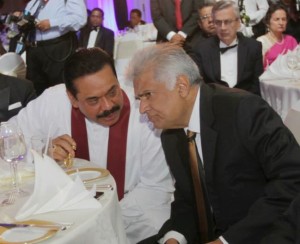 The motion to help Mahinda Rajapaksa at the upcoming Presidential election had been proposed abruptly without any notice of a resolution throughout a meeting held to consider some documents submitted to the Central Committee. Despite the fact that senior members such as Lal Wijenayake, Dr Jayampathy Wickramaratne Pc, Prof. Vijaya Kumar, S Ramanathan, Wimal Rodrigo, Keerthi Kariyawasam and Chameera Perera protested against the motion, it had been passed with 25 members voting in favour of it.
The motion to help Mahinda Rajapaksa at the upcoming Presidential election had been proposed abruptly without any notice of a resolution throughout a meeting held to consider some documents submitted to the Central Committee. Despite the fact that senior members such as Lal Wijenayake, Dr Jayampathy Wickramaratne Pc, Prof. Vijaya Kumar, S Ramanathan, Wimal Rodrigo, Keerthi Kariyawasam and Chameera Perera protested against the motion, it had been passed with 25 members voting in favour of it.

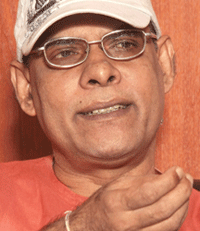
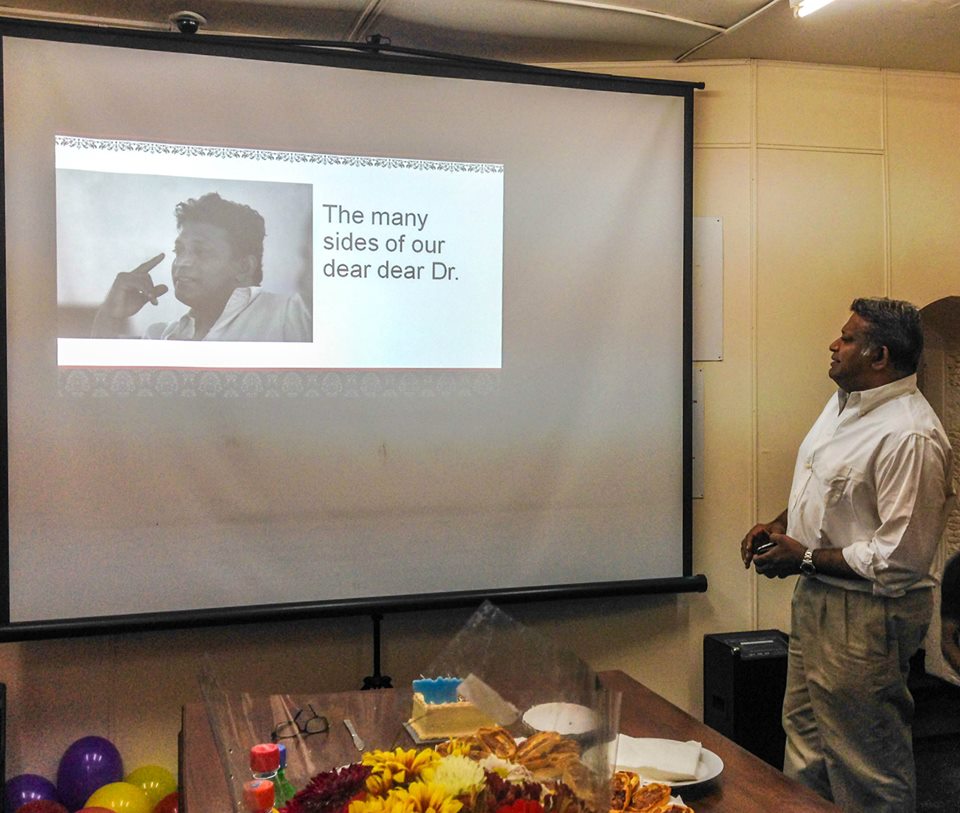

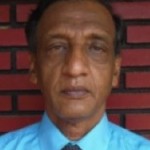
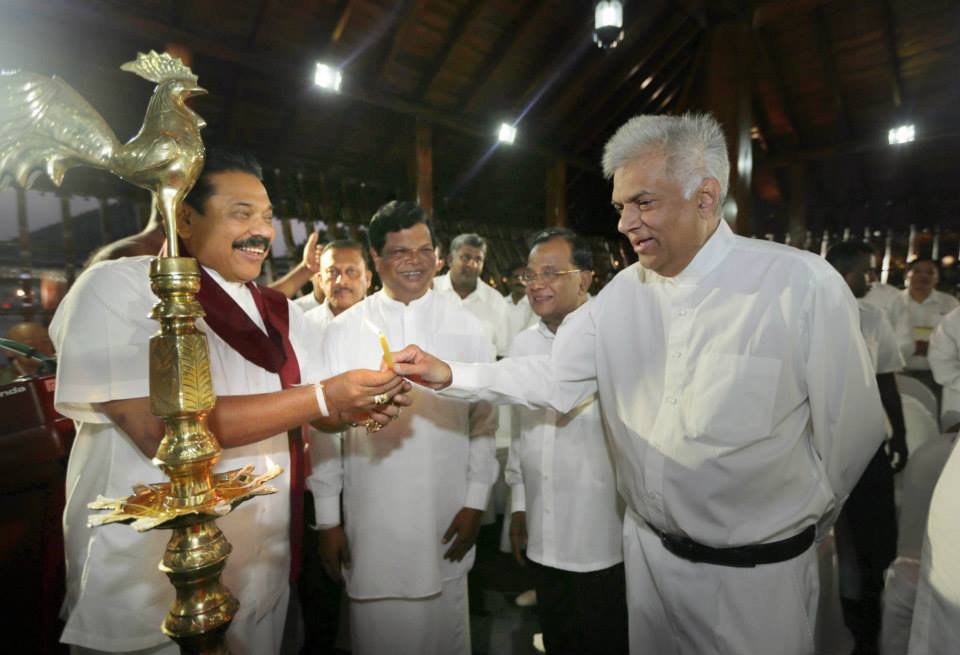 Mahinda started his campaign in earnest by going to Jaffna and giving land deeds and gold to the Tamils. As he did in the course of the last Presidential elections he has begun to summon state workers to the Temple Trees. He talked to the workers of the Well being sector in the morning and in the afternoon he held a meeting for the personnel of the Agriculture sector last week. As he knows the path to the thoughts lies by way of the stomach he in no way hesitates to treat these who are invited to the temple Trees with meals with each other with propaganda material. Now don’t ask me whether he spends his personal cash or your tax money to fill the invitees’ stomachs in order to pocket their votes.
Mahinda started his campaign in earnest by going to Jaffna and giving land deeds and gold to the Tamils. As he did in the course of the last Presidential elections he has begun to summon state workers to the Temple Trees. He talked to the workers of the Well being sector in the morning and in the afternoon he held a meeting for the personnel of the Agriculture sector last week. As he knows the path to the thoughts lies by way of the stomach he in no way hesitates to treat these who are invited to the temple Trees with meals with each other with propaganda material. Now don’t ask me whether he spends his personal cash or your tax money to fill the invitees’ stomachs in order to pocket their votes.
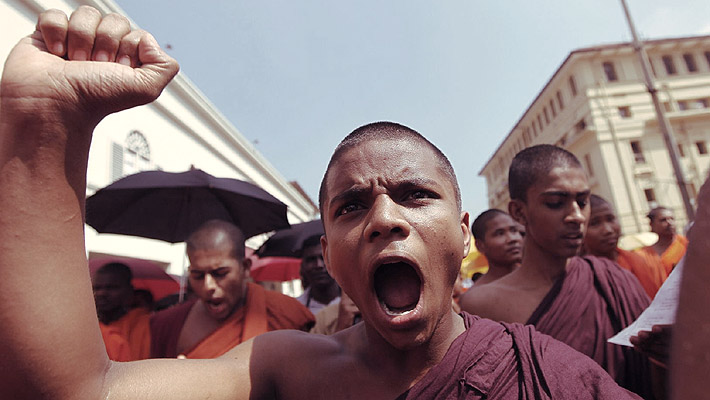 The Thripitakaya, written 500 plus years right after the death of Gautama Buddha with 80,000 plus sermons to comply with, how it came to be written or concerns of its authenticity is no much more critical as long as its teachings are helpful, if followed that is. What ever religion one particular might stick to, the beauty of the Buddhist philosophy or its sensibility can not be simply disputed or denied.
The Thripitakaya, written 500 plus years right after the death of Gautama Buddha with 80,000 plus sermons to comply with, how it came to be written or concerns of its authenticity is no much more critical as long as its teachings are helpful, if followed that is. What ever religion one particular might stick to, the beauty of the Buddhist philosophy or its sensibility can not be simply disputed or denied.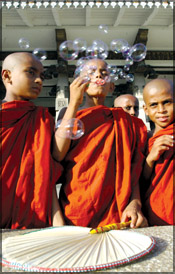 Even though Nirvana (Nibbana) can be achieved only when the fire of greed and hatred is extinguished, in practical terms, the state of Dukkha (full peace) can be accomplished only if no money is transacted, when detached from luxuries in life and worldly pleasures, when not in a state of intoxication or when non-violent or not dishonest among other positive attributes. Expecting majority of present day monks to abide by Vinaya (guidelines of discipline) would be unrealistic and herein arises the query of identifying the pious from the devious.
Even though Nirvana (Nibbana) can be achieved only when the fire of greed and hatred is extinguished, in practical terms, the state of Dukkha (full peace) can be accomplished only if no money is transacted, when detached from luxuries in life and worldly pleasures, when not in a state of intoxication or when non-violent or not dishonest among other positive attributes. Expecting majority of present day monks to abide by Vinaya (guidelines of discipline) would be unrealistic and herein arises the query of identifying the pious from the devious.